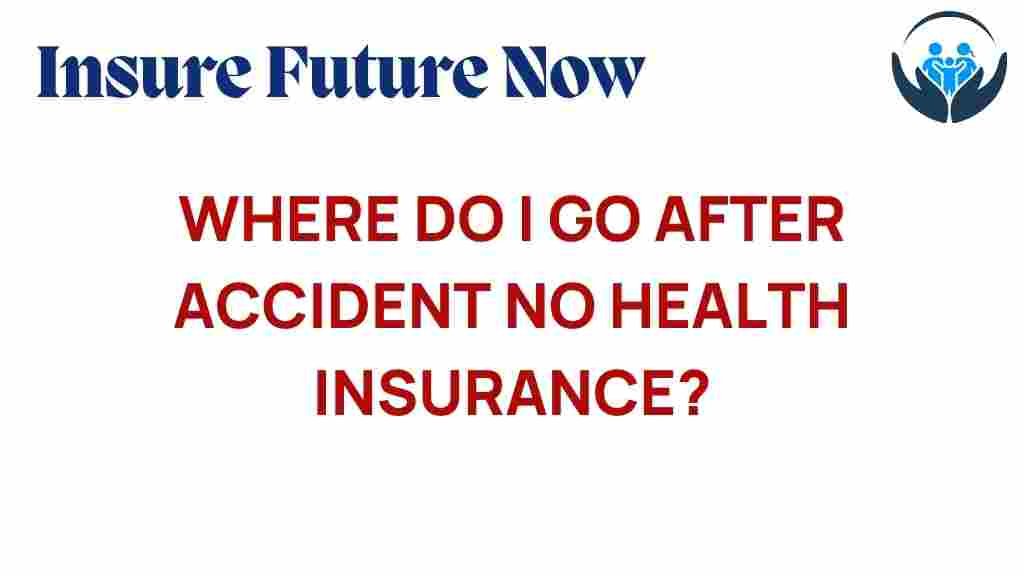Experiencing an accident can be a traumatic and life-altering event, and without health insurance, the road to accident recovery may seem daunting. Medical expenses can pile up quickly, leading to financial strain and uncertainty about your healthcare access. However, there are alternatives to traditional health insurance that can help you manage the costs associated with your recovery. In this article, we will explore various avenues for obtaining medical care, financial aid, and community resources to support you during this difficult time.
Understanding the Impact of Accidents on Your Life
Accidents can lead to physical injuries, emotional distress, and significant financial burdens. Without health insurance, the challenges can be exacerbated. Here are some key points to consider:
- **Medical Expenses**: Accidents often lead to urgent medical needs, including emergency services, hospital stays, and rehabilitation.
- **Emotional and Mental Health**: The psychological impact of an accident can be profound, requiring therapy or counseling.
- **Financial Strain**: Without insurance, medical bills can accumulate quickly, leading to debt and financial instability.
Step-by-Step Process for Accident Recovery Without Health Insurance
Recovering from an accident without health insurance involves a multi-faceted approach. Here are the steps you should take:
1. Assess Your Medical Needs
Immediately after an accident, it’s crucial to evaluate the extent of your injuries. Seek emergency services if necessary. If your injuries are not life-threatening but require medical attention, consider the following:
- Visit urgent care centers, which often have lower costs than emergency rooms.
- Look for community health clinics that provide services on a sliding scale based on income.
2. Explore Health Insurance Alternatives
If you find yourself without health insurance, consider the following alternatives:
- **Short-Term Health Insurance**: These plans can provide temporary coverage for unexpected medical expenses.
- **Catastrophic Health Insurance**: Designed for young and healthy individuals, these plans typically cover major medical events after a high deductible.
- **Health Sharing Plans**: These are not insurance but rather a way for groups of people to share medical expenses.
3. Seek Financial Aid and Assistance Programs
Many hospitals and healthcare providers offer financial assistance programs. Here’s how to find help:
- Contact the billing department of your hospital or provider to inquire about financial assistance.
- Look for non-profit organizations that provide support for accident victims.
- Investigate local government programs that may offer financial aid for medical expenses.
4. Utilize Community Resources
Communities often have resources available for individuals who are uninsured. Consider the following:
- Local charities and non-profits may offer medical assistance or connect you with healthcare providers willing to work with you.
- Community health organizations can provide access to low-cost or free medical services.
- Support groups for accident victims can offer emotional and practical support.
5. Negotiate Medical Bills
Once you receive medical care, don’t hesitate to negotiate your bills. Here are some tips:
- Request an itemized bill and review it for any discrepancies.
- Contact your healthcare provider to discuss your financial situation and see if they can offer a discount.
- Ask about payment plans that allow you to pay your bill over time without accruing interest.
Troubleshooting Tips for Uninsured Care
Without health insurance, navigating medical care can be challenging. Here are some troubleshooting tips:
- **Stay Organized**: Keep track of all medical documents, bills, and correspondence with healthcare providers.
- **Follow Up on Bills**: If you receive a bill that seems incorrect, don’t hesitate to follow up until it is resolved.
- **Be Proactive**: Regularly check in with your healthcare providers about your treatment plan and any potential costs.
Accessing Emergency Services
In cases of emergency, it’s important to know your rights and options:
- Emergency services must treat you regardless of your insurance status. However, they may bill you for the services rendered.
- Consider contacting local hospitals in advance to inquire about their policies for uninsured patients.
Finding Mental Health Support
Accidents can also lead to mental health challenges. To access support:
- Search for community mental health resources that offer services on a sliding scale.
- Look for online therapy options, which can be more affordable.
- Consider support groups for trauma recovery, which can provide a sense of community and shared experience.
Conclusion: Building a Path Forward After an Accident
Navigating life after an accident without health insurance is undoubtedly challenging, but it is not insurmountable. By exploring health insurance alternatives, seeking out financial aid, and utilizing community resources, you can manage your medical expenses and work towards recovery. Remember to assess your needs, communicate with healthcare providers, and advocate for your health and financial well-being. With determination and the right resources, you can successfully navigate this journey towards healing.
For more resources and support, check out this external link to organizations that can help you find healthcare access.
Additionally, visit our internal link for more articles on managing healthcare without insurance.
This article is in the category Tips and created by InsureFutureNow Team
